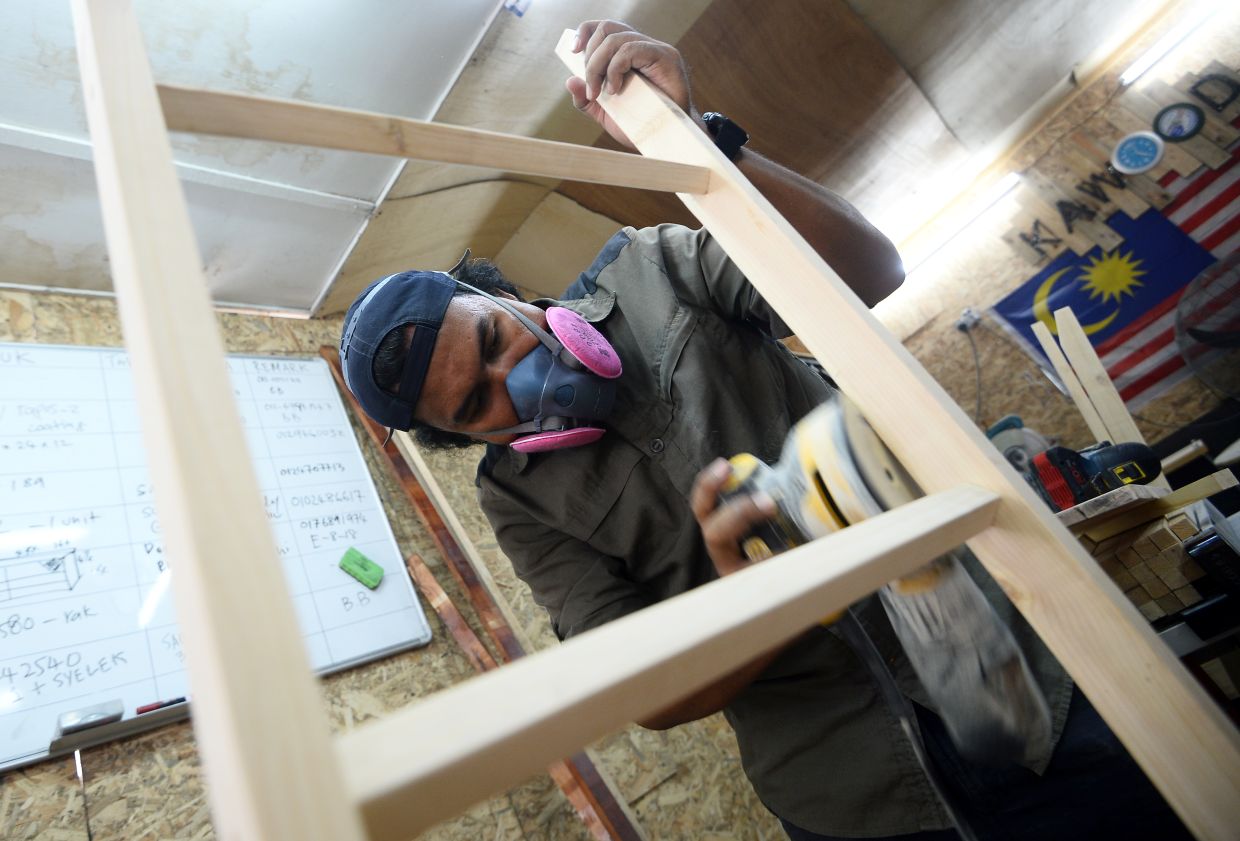Carpentry promotes sustainable practices in our community. Photo: The Star/Azhar Mahfof
A few years ago, chemical and environmental engineer Elyse Teoh, 33, signed up for her first carpentry workshop in Petaling Jaya, Selangor, to learn how to make a wood rack.
She wanted to explore a new hobby and today, she’s the co-owner of a company that runs woodworking workshops in PJ.
“I’ve always liked crafting, embroidery, carpentry and making concrete pots. There is a sense of satisfaction and achievement from making something from scratch.
“I have always been intrigued by woodworking and all sorts of crafts. Seeing the ideas and designs in my head come to life and knowing that we have the ability to build something usable from scratch is satisfying in its own way,” said Teoh in an email interview.
In 2022, Teoh launched The Wood Place with her friend Derek Koo, 39, who is also a chemical engineer and carpentry enthusiast. Both of them hold full-time jobs in the construction chemicals industry while running this business on the side, with the help of four staff.
Teoh’s goal is to empower women and other carpentry enthusiasts by offering opportunities to learn valuable skills and gain confidence in using power tools.
“One of the things that surprised us most is that most of our participants are female. There were also a lot of sessions where it was the girlfriend or wife who signed up for the class and brought their partner along.
“At the core of everything, Derek and I wanted to create a space for the community to share what we know, learn from one another, and create a safe environment for everyone to build together,” said Teoh, who further honed her carpentry skills by watching videos on social media platforms like YouTube, Facebook and Instagram.
A growing trend
Recently, numerous companies have started offering DIY (Do-It-Yourself) carpentry courses catering to individuals from diverse backgrounds.
Aida Ihsani, a self-taught carpenter, is well-known for conducting exclusive carpentry workshops for women.
Meanwhile, Re:Kayu focuses on empowering B40 youths by imparting basic woodworking skills using recycled wood pallets. Additionally, kitabinamy provides a variety of woodworking courses for children and team-building activities.
Teoh reckons that DIY carpentry courses are gaining traction as people are beginning to develop a deeper appreciation for furniture, craftsmanship and sustainability.
“It helps to cultivate a mindset of trying to fix something that’s broken instead of just tossing it away and purchasing a brand new item. Another thing that we would like to highlight is the importance of raising awareness on the issues related to fast furniture. Most furniture sold online are fast furniture – mass manufactured goods that are usually made with inexpensive materials which may not last.
“With its short lifespan, these furniture ends up in landfills, posing many other environmental issues as well. Learning how to build your own furniture with good quality materials will help reduce issues that come along with fast furniture too,” says Teoh.
Mohd Faisal Ayob, 40, who leads the classes at Re:Kayu, says using wood pallets to build furniture promotes sustainability. The pallets are collected from factories across the Klang Valley.
“By repurposing materials that would otherwise go to waste, we can reduce landfill contributions, conserve natural resources, and lower the carbon footprint associated with producing new materials. This eco-friendly practice encourages creative recycling and supports a more sustainable and responsible approach to furniture-making.”
Re:Kayu has provided free carpentry training to over 50 youths from the People’s Housing Project (PPR) and B40 communities in the Klang Valley over the past three years.
“During our two-day programme, participants learn about various carpentry techniques and skills, including material selection, design drawing, lamination and finishing. They also hone their creativity and innovation by making furniture like beds, study tables and shoe racks. With this knowledge, they can work towards earning an income.”
Teoh added that one of the benefits of learning carpentry is people get to stretch their money by making DIY items.
“There are a lot of materials from old furniture or scrap wood that can be upcycled into different items. We believe learning carpentry not only allows people to know how to do that, but to spark even more ideas on what they can do.”
Teoh’s classes are designed around Malaysian solid wood as they want to raise awareness on the quality and beauty of local timber.
“Besides that, importing wood from overseas has a much higher carbon footprint due to the transportation process, which we are very mindful of too.
“We take the extra step to ensure our suppliers are registered with the Malaysian Timber Industry Board and are certified by the Programme for the Endorsement of Forest Certification. This ensures that the timber is sourced from forests that are managed responsibly, ensuring wood is harvested in a way that doesn’t deplete the forest resources,” she said.









